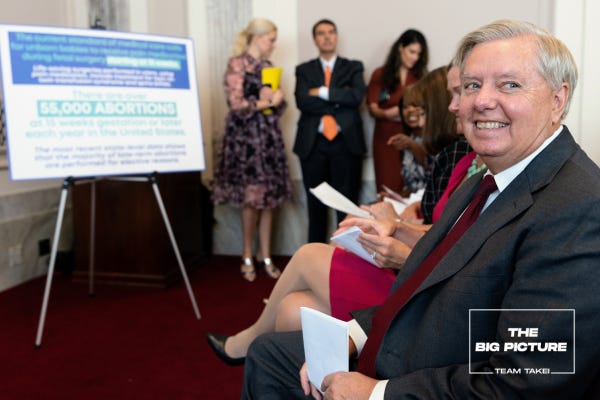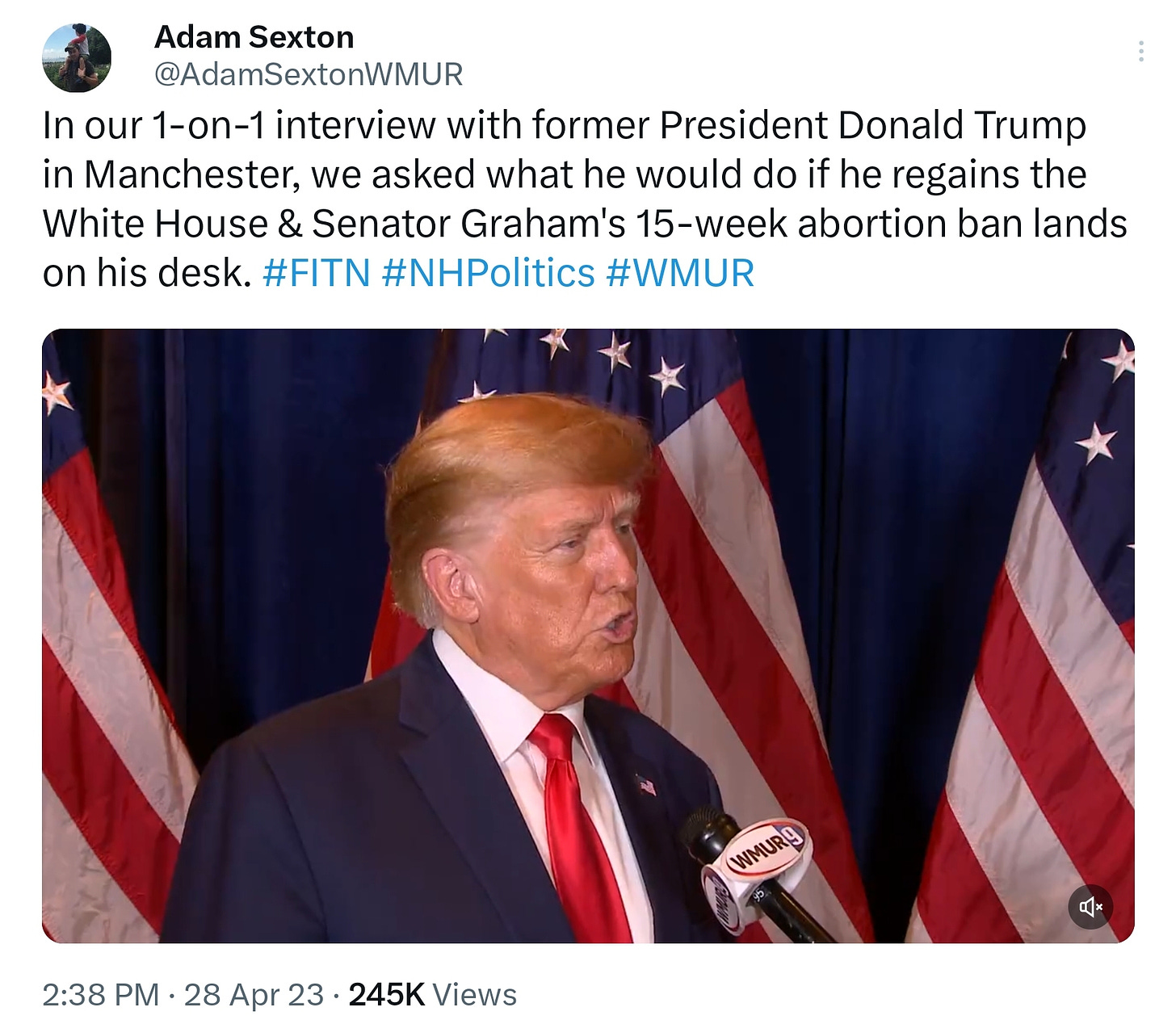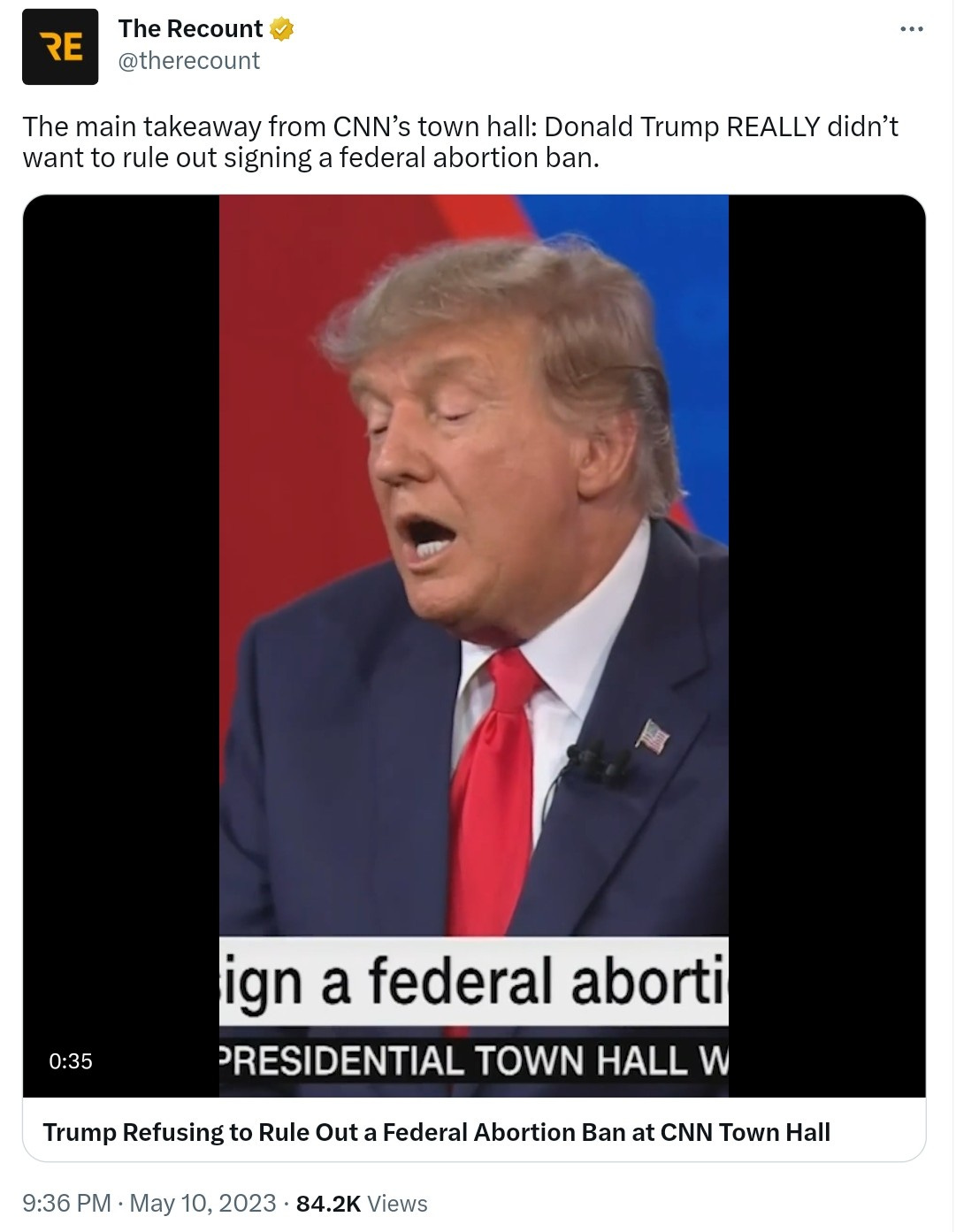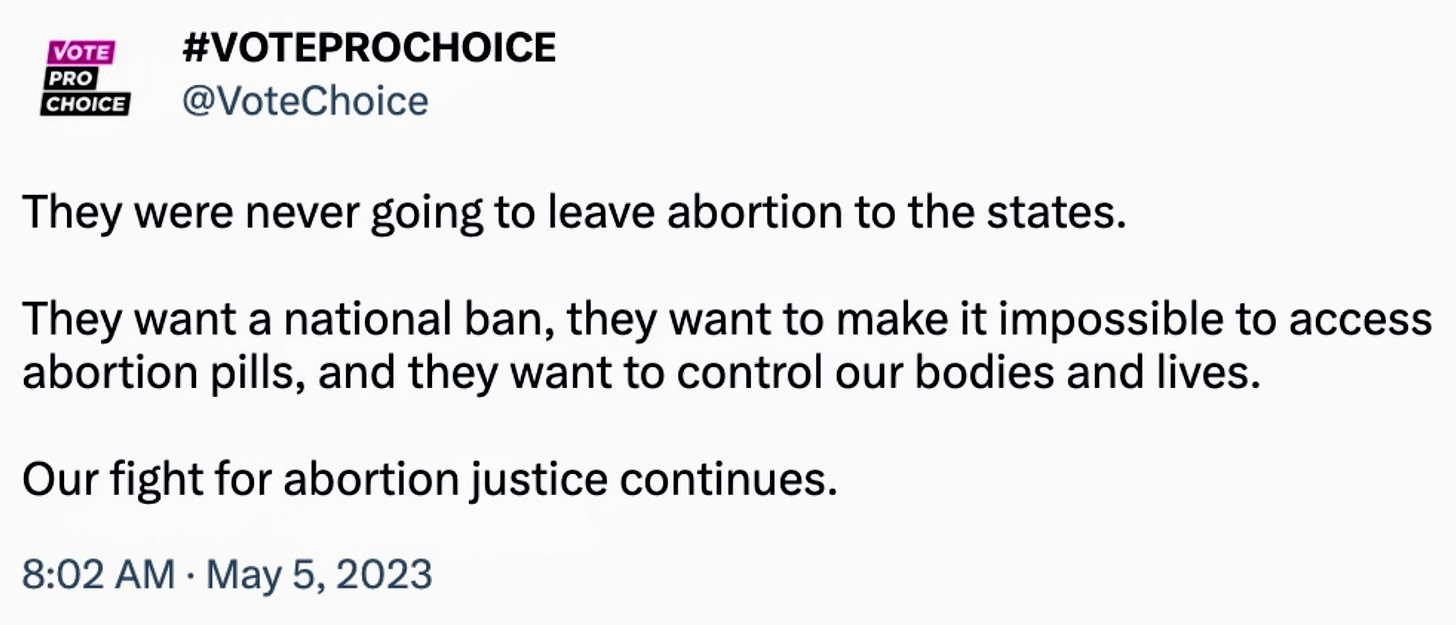Overturning Roe v. Wade Was Never About "States' Rights"
Republicans and right-wing pundits claimed they wanted states to decide on abortion rights, but then they pushed federal legislation for national bans.

Republicans love to claim the high road in the abortion debate, saying The Supreme Court’s radical Dobbs decision simply sent the issue “back to the states” where they claim it belongs.
But you and I know the notion that Republicans just want abortion handled at the state level is a complete farce, as much as some politicians still like to pretend it’s true.
The fact is the Republican Party has been hijacked by a White Christian nationalist movement that wants to impose its own “morality” on the entire country, not merely red states.
And now those chickens are coming home to roost as Republican candidates find themselves in a tug-o-war between their hard right base’s desire for a national ban and the political reality that such a policy is far outside the American mainstream.
This is today's topic in The Big Picture.
– George Takei
When the Supreme Court issued its Dobbs v. Jackson Women’s Health decision last summer—overturning Roe v. Wade’s abortion rights protections—the line on the right was "hey, it’s no big deal, this ruling doesn’t outlaw abortion, it just sends abortion policy back to the states."
Or as the Supreme Court’s majority opinion put it:
"The Constitution does not confer a right to abortion; Roe and Casey are overruled; and the authority to regulate abortion is returned to the people and their elected representatives."
While it’s true Dobbs did not outlaw abortion nationally, abortion policy remaining at the whim of state legislators is not at all where the conservative anti-abortion movement wants it, nor is it where the Court’s conservative majority envisions it will remain.
In the Dobbs dissent, Justices Breyer, Sotomayor and Kagan laid out in their minority opinion the stark path the majority opinion set us upon:
"Today’s decision permits 'each State' to address abortion as it pleases. …After this decision, some States may block women from traveling out of State to obtain abortions, or even from receiving abortion medications from out of State."
"Some may criminalize efforts, including the provision of information or funding, to help women gain access to other States’ abortion services. Most threatening of all, no language in today’s decision stops the Federal Government from prohibiting abortions nationwide, once again from the moment of conception and without exceptions for rape or incest. If that happens, 'the views of [an individual State’s] citizens' will not matter."
Precisely—pro-choice blue states be damned.
Or as #VoteProChoice aptly puts it:
And in fact, less than a year after the Court overturned Roe v. Wade, these worst-case scenarios laid out by the Court’s minority—which are really just the logical extensions of the majority opinion—are already a reality.
Pushing A Nationwide Christian Nationalist Agenda
In September of 2022, just months after Dobbs came down, South Carolina Republican Senator Lindsey Graham stood with anti-abortion activists and—contrary to the GOP spin that abortion policy had now been sent to the states—introduced his 15-week national abortion ban.
Graham said clearly:
"There is a consensus view by the most prominent pro-life groups in America that this is where America should be at the federal level."
He elaborated:
"States have the ability to do it at a state level, and we have the ability in Washington to speak on this issue if we choose. I have chosen to speak."
According to Graham, 15 weeks “should be where America’s at.”
You see, for this new brand of Christian nationalist conservatism, the old days of “federalism” and “local control” have given way to a new era of legislating morality for the entire country, forcing government into our bedrooms, hospital rooms, and homes.
Take the April 7 ruling by Trump-appointed Judge Matthew Kacsmaryk who sided with the Alliance Defending Freedom (ADF) to block access to mifepristone—a drug used in 54 percent of all abortions in the United States. This sweeping and widely-mocked ruling would not just ban the drug from being mailed to states where abortion is illegal, it would create a national prohibition.
The ADF—which notably describes itself as “Committed to protecting religious freedom, free speech, the sanctity of life, parental rights, and God's design for marriage and family”—judge shopped to get Kacsmaryk for this case specifically, and boy did he deliver.
The good news, for now anyway, is that Kacsmaryk’s decision may have been even too much for the Supreme Court. The SCOTUS stayed the decision while the legal battle plays out, ensuring mifepristone remains widely accessible…for now. In a hearing yesterday, the conservative 5th Circuit Court of Appeals appeared sympathetic to Kacsmaryk’s initial ruling, perhaps signaling its willingness to restrict access to the drug nationwide.
The other piece of the right-wing policy puzzle the dissenting justices warned about—red state bans on out-of-state travel to get an abortion—has already occurred in Idaho, which invented an entirely new crime in order to deter crossing state lines to access abortion care: Abortion trafficking.
Idaho’s law, which went into effect in early May, seeks to punish anyone who assists a minor in crossing out of Idaho to another state to seek abortion care with up to five years in prison. This is widely considered the nation’s most extreme abortion restriction and hence not just a model for other red states to replicate, but a gateway to further restrictions on adults seeking abortion care out of state.
As Elisabeth Smith of the Center for Reproductive Rights made clear:
"That is the way, historically, all abortion restrictions have begun: by first limiting young people's access, and then moving to adult access.”
The Republican Game Of Tug-O-War
When Lindsey Graham stood with far-right anti-abortion groups on September 13, 2022, to introduce his national 15-week abortion ban, it was seen by many Republicans as “going rogue” and even potential “sabotage” of the impending November midterm elections.
By that time it was clear a majority of voters disagreed with the Supreme Court’s decision to overturn Roe v. Wade. A Fox News poll from September 2022 found 57 percent of voters supported legal abortion in all or most cases—representing a 13-point jump since May of that year.
So Republican operatives devised a communications strategy—that “states, rather than the federal government, should set abortion law”—to limit the fallout in November.
This strategy, which Graham’s announcement completely upended, was certainly how a blindsided Senate Minority Leader Mitch McConnell would have preferred to play it. At the time, McConnell referred questions about the bill to Graham because, as he put it, most Republican Senators:
“...prefer this be handled at the state level.”
And as McConnell’s number two in the Senate, John Cornyn of Texas made clear:
“That wasn’t a conference decision. It was an individual senator’s decision.”
Sure enough, just weeks later, the November elections were indeed a triumph for Democrats, increasing their Senate majority by one seat and holding House Republicans to a measly five-seat majority. It was a historically poor performance for the party out of power in a midterm.
This result was largely seen as having been boosted by mobilization among young people and female voters in the wake of the Dobbs decision.
So much so that even former Republican President Donald Trump, when asked about Florida’s 6-week abortion ban—which Ron DeSantis had signed behind closed doors and promoted with a late-night press release—reportedly told his team:
“States’ rights.”
Which is precisely how his campaign spokesman, Steven Cheung, spun it:
“President Donald J. Trump believes that the Supreme Court, led by the three Justices which he supported, got it right when they ruled this is an issue that should be decided at the State level.”
Safe, right?
Wrong.
For abortion extremists, not even the twice-impeached, indicted, and disgraced former President who brought the Dobbs ruling to fruition by stealing two seats on the Supreme Court in his four years, is anti-abortion enough.
Not only do the Evangelical Christian and Catholic right want a national abortion ban, but they firmly believe a national ban is precisely what the Supreme Court laid the foundation for in the Dobbs decision.
As Marjorie Dannenfelser—president of Susan B. Anthony Pro-Life America—made clear in her stern response to Trump’s “State Level” talking point:
“President Trump’s assertion that the Supreme Court returned the issue of abortion solely to the states is a completely inaccurate reading of the Dobbs decision and is a morally indefensible position for a self-proclaimed pro-life presidential candidate to hold. Life is a matter of human rights, not states’ rights.”
Marjorie Dannenfelser, you see, was one of the women who stood alongside Republican Senator Lindsey Graham at his press conference announcing his 15-week national abortion ban. And as the most powerful anti-abortion group in the country, Susan B. Anthony pledged not to support any presidential candidate in 2024 without a firm commitment to signing at least a 15-week ban.
Not even Trump could bully his way through this one. So he did the next best thing—word salad his way out of it.
While Trump campaigned in New Hampshire in April, WMUR asked him about Graham’s national abortion ban, and it was awkward.

The exchange went as follows:
Q: If you’re president again in 2025 and Senator Graham’s 15-week abortion ban lands on your desk, are you going to sign it?
A: We’re going to look at it, we’re looking at a lot of different options. We got it back to the states, we did the Roe v Wade thing…We’ll get something done where everyone is going to be very satisfied, I believe that.
Q: On the national level? A national ban?
A: I think we’ll get it done, on some level, it can be on different levels, but we’ll get it done…we will get that taken care of.
Despite how cringe-inducing Trump’s non-answer was, it was apparently enough for Dannenfelser. Well, that and a visit with Trump at Mar-A-Lago, which she called “terrific,” although she stopped short of endorsing him, insisting she’s taking meetings with all 2024 hopefuls.
But if his recent CNN town hall appearance is any indication, this is going to be a tough tightrope for Trump to walk for the next year and a half. Because thanks to Lindsey Graham, “Will you sign a national abortion ban?” is the one question that will always get asked of these candidates.
During the town hall, CNN’s Kaitlan Collins asked Trump for a firm answer as to whether he would sign a federal abortion ban into law at least 6 times. In response, Trump was weak and mealymouthed, refusing to either commit to it or rule it out.

The 2024 Presidential Election
The dilemma is clear for every Republican running—whether for President or Congress. Committing to a federal abortion ban could secure the support of the fervent anti-abortion Christian right, but lose the vast majority of voters.
As for Trump, President Biden is already making him pay for his rhetoric.
As for the other 2024 hopefuls, some are handling it better than others.
Republican presidential candidate and former Trump-appointed U.N. Ambassador Nikki Haley refused to commit to a federal abortion ban, blaming the media for “dividing” Republicans and then ultimately claiming a federal ban is “not realistic.”
Senator Tim Scott—ironically a GOP Senator appointed by then South Carolina Governor Nikki Haley who is expected to throw his hat in the presidential ring shortly—danced around the issue less skillfully than even Trump in an excruciating interview, before finally landing on support for a federal ban.
Entrepreneur and political neophyte Vivek Ramaswamy is refusing to walk that line. Instead, he came out for a 6-week ban at the state level, insisting it should be left to the states—“like murder”—refusing even the premise of a federal ban.
Former Vice President Mike Pence is the only one who seems unbothered by the dilemma, instead seeing an opportunity to exploit his competitors’ dissembling. Pence, after all, is the OG Evangelical, anti-choice Christian nationalist true believer.
As such, Pence—who has been singing from the same hymnal as anti-choice activists since before the 2022 midterms—stated:
“I've often said I'm pro-life. I don't apologize for it. I'd love to see the sanctity of life restored to the center of American law in all 50 states. But I recognize that may take as long to accomplish in every state in the country as it did to overturn Roe v. Wade, which was nearly half a century. And I'm committed to continue to be a part of that cause."
Which points to a big difference between Pence and most candidates—particularly Trump.
Trump thought overturning Roe v. Wade was the endgame of the anti-abortion crusade and thinks he deserves credit for delivering that on a silver platter. Pence understands—as Susan B. Anthony Pro-Life America does—that for this new brand of Republican extremism that Trump helped unleash, the Dobbs decision was just one step toward an even larger endgame.
Eradicating abortion from the nation—imposing their morality on every American regardless of state or individual beliefs—is the true goal.
And they won’t stop until that’s achieved.







I'm Jewish, and my religious rights are being denied by these laws - and there are multiple lawsuits ongoing on that basis. Judaism not only allows abortion, there are cases where it is mandated, and these laws prevent free exercise of those religious mandates.
And then there's the history of abortion, which the "strongly held religious beliefs" crowd ignore. The original laws about abortion in the US were from the AMA, and were intended to give business to doctors instead of midwives and naturopaths; at the time, in the late 1800s, abortion was common, and allowed until the "quickening", the point at which the pregnant woman felt movement, generally in the 5th month. The original religious objections were racist, and intended to reverse a decline in the birthrate among white Protestant women compared to other groups. But it wasn't until the 1950s, during the Cold War, when the country was patriotically fighting the creeping "scourge" of communism - the same time when "under G-d" was added to the Pledge of Allegiance and "in G-d we trust" was added to currency - that religion became a reason to avoid abortion; until then, a young woman in need of an abortion was most likely to appeal to her priest, minister, or rabbi, who would help.https://www.cnn.com/2016/06/23/health/abortion-history-in-united-states/index.html
I am so tired of the evangelicals talking about the “sanctity of life” as if they’d trademarked the phrase. Don’t talk to me about morality until you show you’re concerned about the condition of living people in need. Sanctity of life includes making sure that children have wholesome food to eat even if their parents don’t work, decent housing, decent education, heath care…… Sanctity of life also means protecting children and adults from gun culture run amuck.